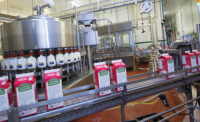Tradition and innovation co-exist comfortably at Clover Sonoma dairy, located in the verdant rolling hills of Sonoma County, California, an area better known for wine than milk.
The Petaluma-based company’s seamless melding of old and new has led to a major change in how the dairy goes to market. Last year, President and CEO Marcus Benedetti committed to processing Non-GMO Project Verified conventional milk. The first half-gallon jugs came off the line in February. The transition will be completed by the end of 2018.
“It’s certainly a gamble, but we feel it’s the right thing to do for a whole host of reasons,” Benedetti said. “If we were on the leading edge of organics, we’re on the bleeding edge of non-GMO supply. There’s some anxiety in terms of how it will do commercially, but no anxiety in terms of whether or not it’s the right thing to do.”
In rolling out the new line, the company cited Consumer Reports which reported that 72% of Americans place importance on avoiding GMOs in products they purchase. And the dairy points to another figure from Packaged Facts that the non-GMO market is expected to grow 15% per year globally from 2014 to 2019.
“We’ve heard loud and clear from [consumers] that this is an issue that they want addressed in their milk supply. We feel like it’s our obligation to do it on their behalf,” Benedetti said.
Clover Sonoma currently has about 150 SKUs across 10 categories, including eggs, butter, ice cream, sour cream, cream, chocolate milk, half-and-half, cheese, cream cheese and kefir. The non-fluid categories are produced by co-packers. (See related article on page 42.)
Clover Sonoma built its traditions over three generations of ownership, dating to the 1977 founding by Gene Benedetti (grandfather of Marcus Benedetti) and a group of partners. Petaluma Cooperative Creamery joined with Stornetta’s Dairy, and until very recently, the dairy was called Clover Stornetta Farms.
Marcus Benedetti’s closest business relationships are with his management team: Ken Gott, chief operating officer and chief financial officer; John Bortells, vice president of sales; Kristel Corson, director of marketing; and Dayna Ghirardelli, producer relations manager.
Non-financial concerns, non-GMO line
Clover Sonoma has paired traditional bottom-line considerations with ecological concerns since the leadership of Dan Benedetti (Marcus’ father) in the 1990s, beginning with the decision in 1994 to commit to an rBST-free milk supply.
Corson, who became director of marketing about a year ago, said that’s when “the brand started getting into that space of wanting to turn milk from being a commodity into being more of a specialty food, listening to what consumers desired.”
Around that same time, the company developed the North Coast Excellence Certified program (now called the Clover Promise of Excellence), a rigorous set of quality standards around sustainable agriculture, humane treatment and complete avoidance of rBST. In 1999, Clover entered the organic market, while continuing to provide a conventional choice for consumers wanting a more affordable milk.
A year later, Clover Stornetta Farms became the first dairy to earn certification from the American Humane Association for its treatment of livestock, after working with the association to develop the criteria similar to those for poultry and swine, Benedetti said. “Their scientific body came out, and we met in living rooms, in kitchens, and with our dairy families,” he said.
Three farms are already on board with the transition to Non-GMO Project Verified milk. But unlike the move to organic, the concept has not necessarily been proven out just yet, Benedetti said. The fact that dairies are going along with Clover’s request is an indication of the tight processor-producer relationship.
“Whether it’s animal welfare, being endorsed by the American Humane Association, whether it’s an early entry into organics, that is the kind of relationship we have been able to enjoy with them, to always be in the position to react to consumers’ expectations,” he said.
Rebranding with nods to heritage
The decision to change the company name was a desire to more broadly capture and reflect the dairy’s Sonoma County roots, Benedetti said.
“We’ve been in the county for three, going on four generations,” he said. “We’ve been fortunate to broaden this franchise to organic milk, to Non-GMO Project Verified conventional milk and beyond the borders of Sonoma County. ‘Sonoma’ resonates with folks, whether you’re in Los Angeles, Arizona or even Hawaii. You know Sonoma to be a place for great wine. What they’re learning now is [Sonoma] also [means] great milk.”
Clover Sonoma has relaunched its website. A campaign in March rolled out the new name with the tagline, “A Fine Sonoma County Milk,” playing off the association to the wine industry.
“It was time,” Corson said. “We hadn’t refreshed the brand or the packaging for decades. The brand has been here for over 100 years. We wanted to honor the heritage and sense of place.”
Clover’s conventional milk packaging dates to the 1980s and the organic to the early 2000s. The conventional packaging has undergone a significant change in look while the organic containers received more of a “refresh,” Corson said, bringing their respective look and feel “from distant cousins, to true relatives” with illustrations that incorporate vineyards in the background.
“One of the biggest things we were trying to do was to create this ‘family’ look, with distinctions between conventional and organic, but one look across the store,” she said. The redesign will be carried out across all of Clover’s products, starting with butter, eggs and yogurt, she added. “This region is about artisanal food, wine and craft. Clover is a craft dairy.”
In innovating the design, Clover Sonoma wanted to be sure to keep one traditional element: its mascot. Clo is a fictional cow prone to puns. She has been gracing the company’s billboards, trucks and other branded materials since her “birth” in 1969.
“She is known for her witty puns and just her fun-loving nature,” Corson said. “She has become a beloved northern California icon. A lot of people have asked with this rebrand: Will Clo stay? Is she going to be part of the brand going forward? And the answer is, absolutely, yes.”
Clover Sonoma probably spends more on outdoor advertising than anything else related to marketing, with significant attention devoted to digital and social media to help build community and loyalty, said Corson.
“We’re trying to have that conversation about dairy,” she said. One place Clover talks to customers face-to-face is at the annual Natural Products Expo West in Los Angeles.
Facilities, consumers and suppliers
Clover’s attributes have jibed most closely to a strong base of independent markets as well as chains in the natural trade like Whole Foods, Benedetti said. Recently, the company has expanded into more traditional mass-market supermarkets. On the foodservice side, white tablecloth restaurants have been the prime target given that “we’re not the lowest-cost producer of milk,” he said.
Corson sees the company’s target consumer market as one that cares the most about where its dairy products come from, how animals are treated and overall quality.
“It connects with the organic consumer who is willing to pay more,” she said. “We have everybody from Baby Boomers to the new generations, being that a dairy product is something you need to have throughout your entire life.”
She added that Clover holds 57% market share within the A.C. Nielsen branded northern California market stretching from the San Francisco Bay Area and east to Sacramento.
“For us, it comes back to listening to our consumers and ensuring that we are delivering the highest quality of milk possible,” she said.
The supply side
Relationships with suppliers are another key to the company’s success, Benedetti said.
“Many of them are multigenerational family farms, not unlike us,” he said. “In that sense, we’re philosophically aligned in that we both hope to make decisions that will carry us to another generation or generations. That always kind of roots us, or grounds us in the relationship. And then, how do we leverage each other’s unique capabilities?”
Benedetti described Ghirardelli, the producer relations manager, as “our glue to the dairy families. She owns all the relationships. She’s the constant go-between on all the unique opportunities we’re constantly working on with them.”
The average dairy farmer supplying Clover has about 400 cows. That’s considerably smaller than the intensive farming found in other parts of the country, Benedetti said.
“Their cost structure is higher as a result,” he said. “They don’t have the mass efficiencies of large animal operations. But there is a real desire on the part of consumers to support this type of farming. The American family farm is disappearing before our eyes. One of our obligations, in addition to providing the best product for our consumers, is to try to capture that value.”
The practices of those family farms are integral to Clover Sonoma’s value proposition to consumers, Benedetti said, given that the processing machinery and techniques used in his company’s plant is essentially no different from that of any other fluid milk processor. The Clover Promise of Excellence standards take key metrics like somatic cell, E.coli and lab pasture counts and go beyond federal and state requirements, he said.
“Fundamental to that is the raw quality of the milk,” Benedetti said. “The benchmark or starting point to tell a different story is rooted in the quality.” The proof of concept for each line of product runs through marketing to determine, “Is it something that comports with the brand equity that either already exists, or we hope to create,” he said. “Can we scale the product line given where the manufacturing lies. Is it cost-competitive? And can we utilize our unique milk supply? Those are the 10,000-foot considerations.”
Benedetti stays current with the changes to the industry and the marketplace by sitting on the board of the Associated Independent Dairies of America, Dairy Institute of California, UC Davis Agriculture Sustainability Institute, Social Advocates for Youth, Wells Fargo Center for the Arts, and the Boys and Girls Club of Marin & Southern Sonoma Counties.
History
Those original owners of the dairy that produced the Clover brand had worked together at the Petaluma Cooperative Creamery (later named the California Cooperative Creamery). It was owned by 400 dairy families and managed in its later years by Gene Benedetti. When a fire destroyed the co-op’s processing and bottling operations in 1975, the members decided not to rebuild. Instead, they sold the Clover brand name (first established in 1916 at the co-op’s founding) to Benedetti and his partners.
“We were founded by undercapitalized partners. They all had to take out second mortgages on their houses,” said Marcus Benedetti. After a stint in the warehouse, handling deliveries and working as a sales rep, Benedetti took over from his father (who still has an office at headquarters) as president in 2006. He became CEO in 2011 and board chairman in 2015.
The company’s shoestring beginnings continue to influence its decision-making, Benedetti said. “It’s kind of been in our DNA now for three generations to stay really close to the market and be relevant,” he said. “Most dairies make decisions based on capital investments in their plants, whereas we’re always kind of backwards, focused on market-based considerations because we just haven’t had the ability to build big, fancy plants.”
Building for the future
Clover will continue to succeed based on its established ties to consumers and suppliers, and the stances it’s taken on non-bottom-line concerns, Benedetti said. The company’s challenges are the other side of that same coin.
“The flip side is an inherently higher cost structure associated with being in a position to do that,” he said. “That has naturally defined for us the market, who we are and where we’re best placed to serve in the market. We can’t be everything to everybody.”
In addition to staying close to consumers, suppliers and retailers, Benedetti said he believes the continued key to success will be thinking imaginatively about the company’s array of products.
He said the company will always have a fluid milk component, but “in five or 10 years, the product development and innovation side of the business is the one that’s going to be the defining economic engine for us as we evolve into more of a CPG company than a traditional dairy company.”
Benedetti also expects the company to remain privately held, which he sees as key to holding firm to the Clover brand’s equity.
Aiming for B Corp compliance or sourcing non-GMO conventional milk when it’s untested commercially are decisions publicly held corporations probably would not make.
“Staying family-held gives you some breathing room to take risks, so long as you can absorb those risks, economically and otherwise,” Benedetti said. “On balance, you have to win more than you fail, so don’t get me wrong. But at least when you fail, you can absorb the pain and keep on moving. I firmly believe that remaining privately held allows a unique value proposition to exist in the first place, and the desire to take it to another generation is, frankly, the only motivator to continue to do this stuff.”
That’s not to say Benedetti sees anything wrong with building and then selling a privately held business. But he clearly aspires to carry forward the traditions of his grandfather and father.
“The heavy lift was done by the founder, my grandfather, and then an equally heavy lift was taken by my father, taking those pioneering stances on rBST and on organics,” he said. “So I feel my obligation to take all those equities and all that hard work they created and leave it in better hands for the fourth generation. And hopefully have some fun and celebrate some victories along the way.”
Eventually, that decision will be up to one or more of Benedetti’s children, Jack, 12; Henry, 10; and Maeve, 8. “Hopefully, one of them or all of them will be interested,” he said. “But the way I look at it, I’ve got 20 more years.”
Clover Sonoma is a certified B Corp
B Corp certification is essentially an audit of a company’s environmental sustainability, employee welfare and community support efforts. It is overseen by the non-profit B Lab, Berwyn, Pa.
An applicant needs 80 points to pass. The average company receives 55 points on the B Corp scale; Clover received 97, said owner Marcus Benedetti.
Clover Sonoma doesn’t intend to simply bask in that achievement.
“The expectation is that you don’t just get into the club, so to speak, and tread water but you continuously improve upon those avenues,” he said.
More than 2,000 companies worldwide enjoy B Corp status, said Director of Marketing Kristel Corson.
“It is a full assessment of companies around their mission, their ethics, their transparency, as well as their social responsibility and environmental sustainability practices,” she said. “This is a true testament to all that Clover has done through the years.”












